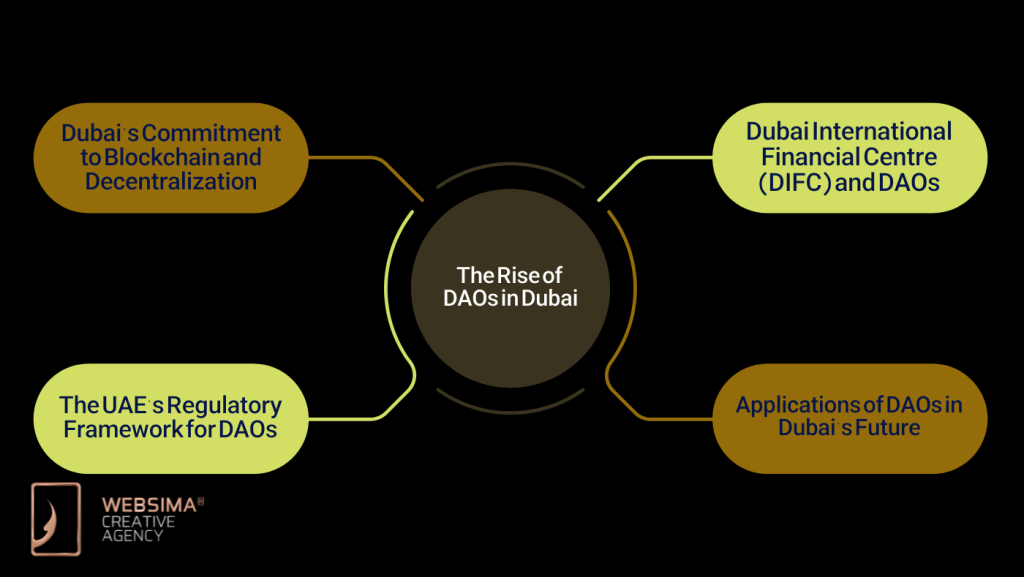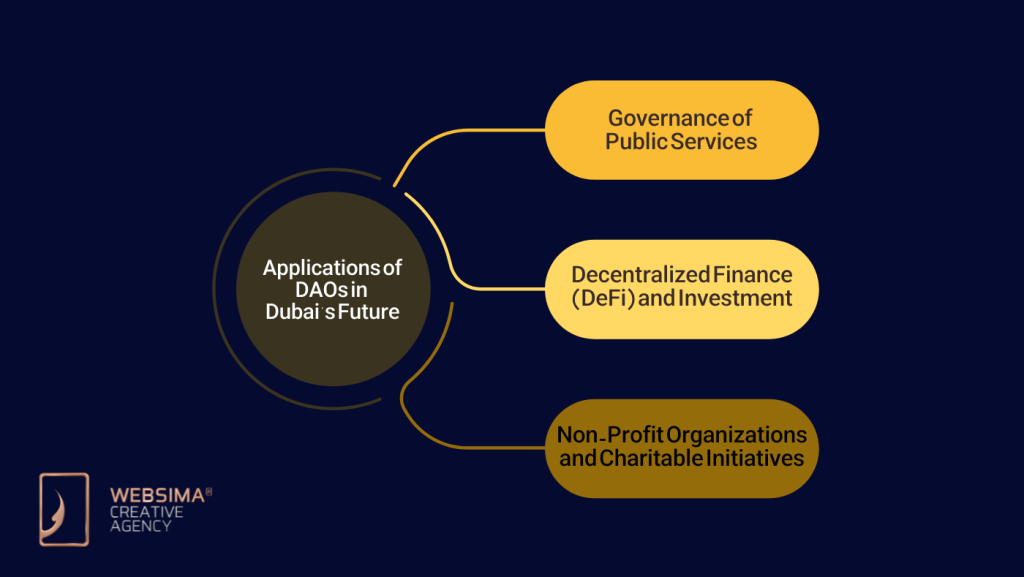Blockchain technology has revolutionized many industries; in fact, one of the most transformative developments is the creation of Decentralized Autonomous Organizations (DAOs). DAOs, in turn, introduce a new form of governance where decision-making is decentralized, transparent, and autonomous, offering a compelling alternative to traditional centralized organizations. DAOs in Dubai, is gaining significant traction, especially as the city strives to integrate decentralized technologies into its vision of becoming a global hub for innovation and technology.
In this article, we will explore how DAOs are shaping the future of governance in Dubai, how they function, and the role they will play in the city’s digital future.
What is a DAO?
DAOs = the future of collaboration. No bosses, no hierarchies—just communities making decisions together on the blockchain.
Transparent, inclusive, and innovative. But not without challenges – governance risks, legal gray areas, and coordination hurdles.
Curious how they work… pic.twitter.com/4yW0FcLPga
— ALLO (@allo_xyz) January 30, 2025
To fully understand the impact of DAOs in Dubai, it’s essential, first, to grasp the concept of a Decentralized Autonomous Organization (DAO).
The Basics of DAOs
A DAO governs itself through smart contracts instead of a traditional leadership structure. The core idea behind a DAO is decentralization – it distributes power and decision-making among all members, rather than concentrating it in the hands of a few individuals or executives. Smart contracts, which are self-executing contracts with the terms of the agreement directly written into code, automate processes and ensure transparency.
Key characteristics of DAOs include:
- Decentralization: No central authority; decisions are made by the collective consensus of members.
- Transparency: All actions and transactions are recorded on the blockchain, ensuring that all members can view and verify the organization’s activities.
- Autonomy: DAOs are managed by smart contracts, which automate the execution of rules and decisions without human intervention.
- Tokenized Governance: DAO members typically hold governance tokens, which grant them voting rights and influence over decisions within the organization.
How DAOs Work
DAOs operate on a blockchain platform, typically Ethereum, which allows for the creation and execution of smart contracts. In turn, smart contracts define the rules of the organization and ensure that decisions are carried out automatically once agreed upon. For example, members of a DAO may vote on proposals, such as funding new projects or implementing new initiatives, and the smart contract will execute the outcome of the vote without requiring human oversight.
The Rise of DAOs in Dubai
Dubai’s forward-thinking government has, therefore, been keen on adopting blockchain and decentralized technologies, positioning itself as a global leader in innovation. As part of its strategy to embrace emerging technologies, the rise of DAO governance models in the Dubai business ecosystem are becoming an integral part of the city’s transformation into a decentralized economy.

1. Dubai’s Commitment to Blockchain and Decentralization
Dubai has made significant strides in becoming a blockchain-powered city. The Dubai Blockchain Strategy, launched in 2016, aims to make Dubai the first fully blockchain-powered city by 2025 and attracts global blockchain investors into Dubai. This initiative reflects Dubai’s commitment to innovation and technological adoption. As part of this strategy, Dubai is actively exploring the use of decentralized technologies, including DAOs in Dubai, to drive more transparent and efficient governance systems.
The Dubai Future Foundation plays a pivotal role in driving this vision. In addition, it supports the development of blockchain-based solutions and explores how decentralized organizations can contribute to the city’s economic and administrative ecosystem.
2. Dubai International Financial Centre (DIFC) and DAOs
Blockchain technology’s impact on Dubai’s financial service industry is significant; as a result, Dubai’s financial ecosystem, particularly the Dubai International Financial Centre (DIFC), has been at the forefront of blockchain adoption and innovation. The DIFC has, therefore, established a regulatory framework for crypto and blockchain companies, thereby positioning itself to support the development and integration of DAOs into its financial services ecosystem.
As DAOs in Dubai grow, the DIFC may become a central hub for decentralized finance (DeFi) projects, enabling organizations to leverage the benefits of blockchain technology, including transparency, efficiency, and decentralization. The DIFC’s ongoing efforts to build a favorable regulatory environment for blockchain-based businesses ensure that Dubai remains a leader in the evolving global blockchain landscape.
3. The UAE’s Regulatory Framework for DAOs
The UAE government recognizes the importance of developing a comprehensive regulatory framework to govern decentralized technologies, including DAOs. This regulatory clarity is essential to protect investors, ensure compliance with international laws, and foster a thriving decentralized ecosystem.
- The Securities and Commodities Authority (SCA): The UAE’s SCA has, therefore, been working to integrate digital asset regulations within its broader financial regulatory framework. As a result, by providing a clear legal foundation for digital assets and DAOs, the SCA, in turn, ensures that DAOs in Dubai operate with transparency and accountability.
- Legal Status of DAOs: Currently, DAOs are not specifically addressed under UAE law; however, the government has shown a willingness to adapt its legal system to support blockchain technologies. Looking ahead, it’s likely that the UAE will, in the near future, introduce specific regulations to define the legal standing of DAOs, thereby ensuring they can operate smoothly within the framework of UAE business laws.
4. Applications of DAOs in Dubai’s Future
DAOs are not just a theoretical concept in Dubai; in fact, they have practical applications that are already beginning to shape the city’s future. Below, we highlight a few areas where DAOs in Dubai could make a significant impact:

A. Governance of Public Services
DAOs could, therefore, transform how Dubai governs public services. With DAOs in place, residents and stakeholders can actively participate in decision-making processes for urban planning, infrastructure projects, and even local government policies. Furthermore, by using blockchain-based governance models, the system can make decisions more transparently and equitably, ensuring that everyone has a voice.
For example, DAOs could manage urban development projects, such as allocating resources, enforcing environmental regulations, or overseeing community programs. Smart contracts would ensure that these projects follow agreed-upon rules without the need for intermediaries.
B. Decentralized Finance (DeFi) and Investment
The UAE has become a hub for financial innovation, and as a result, DAOs are positioned to play a significant role in this sector. Specifically, DAOs in Dubai could drive the growth of decentralized finance (DeFi) by providing a governance structure for DeFi projects, thereby enabling investors to engage with digital assets, lending, and borrowing in a decentralized manner.
By utilizing DAOs in Dubai, financial services could be democratized, allowing users to participate directly in financial decision-making processes, such as voting on investment strategies, project funding, and risk management.
C. Non-Profit Organizations and Charitable Initiatives
DAOs have the potential to revolutionize the non-profit sector by providing a decentralized and transparent way to manage charitable initiatives. In Dubai, for example, we could see DAOs focused on philanthropic causes, where donors, volunteers, and other stakeholders directly participate in decision-making and resource allocation. As a result, this model ensures accountability and transparency, since blockchain records all financial transactions and governance decisions.
The Challenges and Future of DAOs in Dubai
While DAOs in Dubai offer many benefits, challenges still need addressing for their widespread adoption. Some of the key challenges include:
- Legal and Regulatory Clarity: The legal status of DAOs in Dubai remains somewhat ambiguous. Clear regulations will be necessary to ensure that DAOs are able to operate within the UAE’s legal framework while protecting the rights of stakeholders.
- Scalability: As more organizations adopt DAO structures, ensuring the scalability of blockchain networks to handle large-scale operations will be crucial.
- Adoption by Traditional Institutions: The transition from traditional governance models to decentralized systems will require education and buy-in from traditional institutions, including businesses, financial services, and government bodies.
Despite these challenges, the future of DAOs in Dubai looks promising. With continued support from the UAE government and the growing blockchain ecosystem, DAOs will become an integral part of Dubai’s future governance landscape.
Conclusion: DAOs in Dubai and the Future of Governance
The rise of DAOs in Dubai marks an exciting new chapter in the city’s journey toward technological innovation and governance reform. By leveraging blockchain technology to decentralize decision-making, DAOs have the potential to revolutionize the governance of public services, finance, and other sectors. As Dubai continues to push the boundaries of innovation, DAOs will, therefore, play an essential role in shaping the city’s digital future.
Why Choose Websima for Your Blockchain and DAO Development in Dubai?
If you’re looking to develop DAO solutions or blockchain-based projects in Dubai, Websima is your trusted partner. As a leading blockchain service provider in Dubai, Websima specializes in:
- Blockchain and Web3 development
- DAO development and integration
- Smart contract programming
- Crypto and Web3 company establishment in Dubai
Contact Websima today and build your decentralized projects in Dubai’s thriving blockchain ecosystem. Get in touch to start your DAO development journey now!





